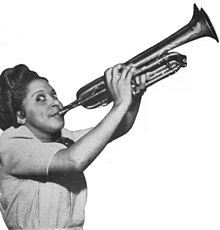Valaida Snow
1905–1956
“Queen of the Trumpet”
By Annie Y. Liu
Valaida Snow was an American jazz multi-instrumentalist (including trumpet, saxophone, clarinet, violin, cello, accordion, banjo, mandolin, and harp) as well as a dancer, singer, arranger, producer, and conductor. Her musical and intellectual abilities stunned all who witnessed her perfect pitch and her command of seven languages.
Born in Chattanooga, Tennessee in 1905 to a musical household, Valaida began performing at only 4 years old, and by 18 years of age, she gigged all over the US, even playing on Broadway by 1924. She went on tour to Shanghai in 1926 with Jack Carter’s octet, with whom she played at the Plaza Hotel for a year. From there, she returned to the US, frequently going on tour to Europe while starring in numerous bands and shows all over the US. She visited Shanghai again in 1937, though by then the increasing presence of Japanese forces prompted most foreign musicians to leave.
During a 1940 tour to Copenhagen, Valaida was arrested by Nazis and sent to the Wester-Faengle internment camp, where she stayed for eighteen months, enduring brutal physical punishment, minimal food, and sickness. She returned to New York in 1942 unrecognizable to her close friends and colleagues. Her physical health never fully recovered from her internment, though she eventually resumed her performance career. In 1956, she began performing three shows a day at the Palace Theater in New York, and the strain on her body proved too much, as she had a stroke and passed 21 days later on May 30th due to cerebral hemorrhage.
Though Valaida Snow only visited Shanghai twice during her career, her experience displays how famous touring jazz performers (like Buck Clayton) frequented Shanghai and had a lasting influence on Shanghai’s popular music.
Miller, Gregory. “Snow, Valaida.” In Encyclopedia of the Harlem Renaissance, edited by Cary D. Wintz & Paul Finkelman. New York: Routledge, 2004.
Reitz, Rosetta. “Hot Snow: Valaida Snow (Queen of the Trumpet Sings & Swings.” Black American Literature Forum 16, no. 4 (1982): 158–160. https://www.jstor.org/stable/2904225



